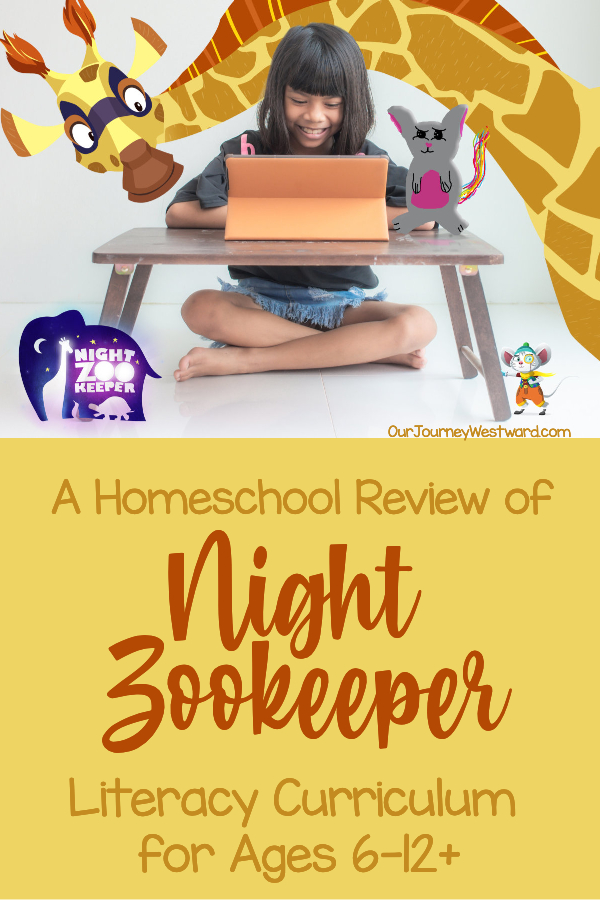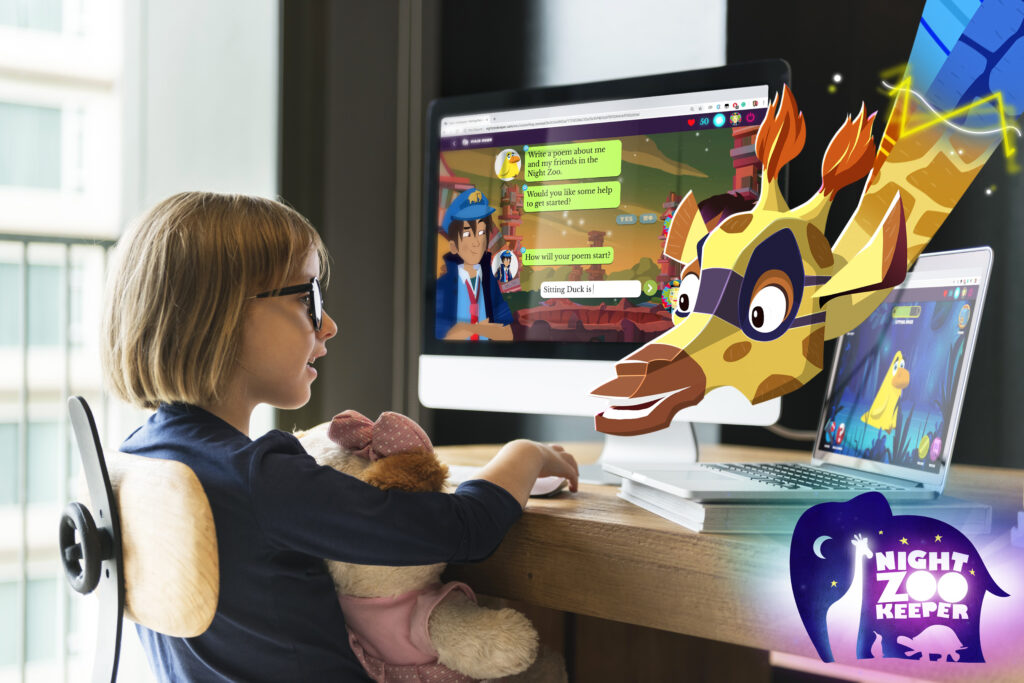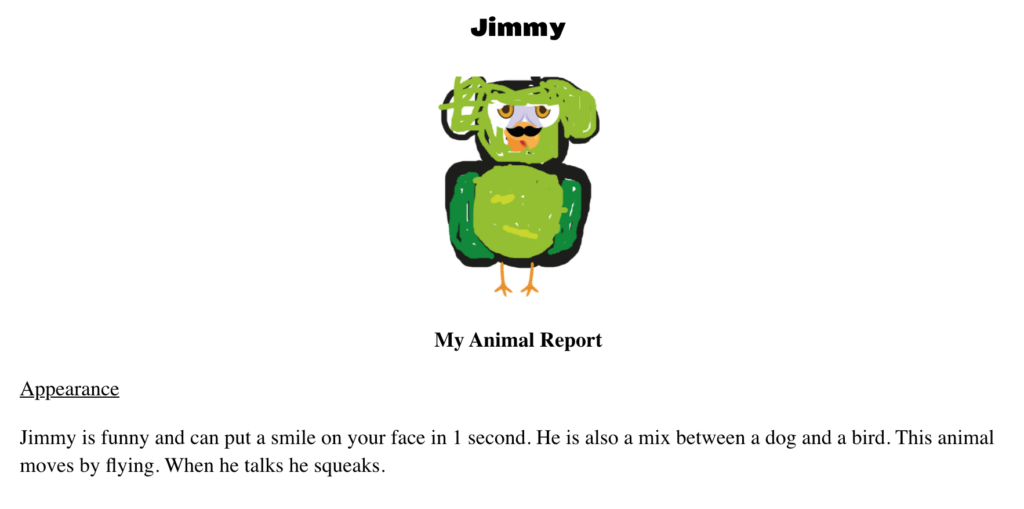Your Children Can Enjoy Language Arts! Night Zookeeper Review
Looking for a Night Zookeeper review? Look no further. You’ve found a thorough one here!
One of my favorite benefits of blogging is that I get to communicate with so many different homeschooling parents from all around the world. Families of all shapes and sizes, veteran homeschoolers to those just beginning to consider it, all sharing two things: the same desire to do what’s best for their children, and at least one kid who just seems to hate language arts.
Sure, there are competitive kids who love a good spelling test and analytical ones who diagram sentences for fun. We all know bookworms who gobble up the written word, too. But consistently, I meet students who simply do not enjoy language arts – especially writing.

My own children would rather do all of the dinner dishes by hand than create an outline for a persuasive essay. Some kiddos rush through writing, paying little attention to grammar or structure, while others are so full of stories that creative writing exercises become stream-of-consciousness epics. And there are others, well…bribing sometimes works.
With all of these writing power struggles, I was absolutely thrilled when I was offered the opportunity to try out Night Zookeeper’s language arts program!

I was granted free access to the Night Zookeeper online program for the purpose of writing a completely honest review. I have been compensated for the time it took me to write the review and you will find affiliate links within the blog post.
What is Night Zookeper?
Night Zookeeper is an online, award-winning, all-encompassing literacy curriculum that teaches reading, grammar, punctuation, spelling, and yes, writing to children from ages 6 – 12+. I use the word “curriculum” a little loosely, though – Night Zookeeper is more of a platform full of fun, connection, competition, and learning!
Using interactive creative writing prompts, games, recorded lessons, message boards, contests, and even drawing, Night Zookeeper seems too fun to be teaching, but it works brilliantly. Each child has their own “zoo”, which they grow throughout the program to include fantastical creatures and explore to find new games.

The first assignment is to create a magical creature for their night zoo, then follow the prompts that walk them through naming their creature, describing it, and almost effortlessly writing their first creative writing piece. Kids earn rewards for each game, lesson, and project they complete, and can then use those rewards to expand their zoo, to earn advantages in other games, buy creatures from their friends’ zoos, and more.
It is encouraged to have your child watch at least two of the engaging and interactive instructional videos a week – that’s all it takes! The assignments and games all come with instructions – and those rewards – so that it really is a hands-off program for parents and an all-in fun one for kids.

Each piece of writing, once submitted, is read by the tutors at Night Zookeeper who then provide helpful, encouraging, positive feedback directly with the student. One of the more brilliant features, in my opinion, is that students are rewarded with more points when they go back and edit their work after receiving feedback. Getting my kids to revisit a piece they’d already decided they were done with can be harder than getting them to create an outline, so I greatly appreciate how this part of the writing process is emphasized and rewarded!
In addition to the brilliant animations and the thorough lessons, one of the most innovative aspects of the program is the community element. Students can create a friends list and invite other zookeepers from their team (grade level) to play spelling games, read a poem they’ve written, or work together for an upcoming contest.
The site is set up to allow students to share writing projects with fellow students and tutors from around the world. This adds a component of community to an already entertaining experience and encouraging kids to cheer one another on in their work. Who doesn’t like positive feedback, right?!
It’s perfect for students who don’t have the access or options for a co-op, families who live across the globe, and for any kid who loves the social aspect of online gaming. The community options take this language arts curriculum to an entirely new level.

Night Zookeeper Safety Features
I’m quite impressed with the measures that Night Zookeeper has put in place to protect the students who participate in the community features.
- Upon opening a “zoo”, each student is given a randomly-generated username that cannot be changed, preventing any usernames that might contain any identifying information.
- Avatars are of students’ own created magical creatures, as no photos are allowed to be uploaded to the site.
- Only drawings and writing can be shared with other zookeepers on the same team as your child.
- Moderators must approve all comments before they are published so that they can flag any potentially sensitive information.
- There is no option for students to directly message each other. Instead, they only encourage one another through comments on writing projects.
- Additionally, the games, contests, and sharing areas are not accessible to the public, only to fellow zookeepers and moderators.
Of course, parents have the option to turn off any and all of these friend and community features for their child’s account, ensuring that you feel comfortable with any level of participation. They will still receive messages with feedback from their tutors, but adding friends and sharing work is not a requirement for the program – it’s just a fun bonus that creates something kids want to return to again and again.
How Do I Use Night Zookeeper?
You simply sign up! For $12.99/month, once you’ve selected your child’s grade level and settings, all of your language arts needs can be met. Parents can view every bit of their student’s work and read every word of feedback provided by the tutors, follow progress, monitor accuracy scores, and even keep track of their child’s zookeeper “friends” through the parent dashboard.
Parents are invited to keep up with Night Zookeeper’s fantastic blog that shares articles, insights, tips, ideas, and writing prompts to keep up-to-date on the latest in literacy education. There are also numerous additional resources, such as books and activity packs, that can be ordered for when you want some off-screen learning, and even free monthly printables.
Really, as a parent, is learning more simple. Just make sure your child sits down at least twice a week for their lessons, and enjoy the bit of respite you’ll get once they’re fully engaged in learning! Night Zookeeper can be used as a complete literacy and language arts curriculum or as a fun supplement, year-round or seasonally to prevent the dreaded “summer slide”. Because everything needed is contained within the site itself, Night Zookeeper is as flexible and helpful as any homeschool needs it to be.

Night Zookeeper Review Wrap-Up
The language arts curriculum from Night Zookeeper is unlike anything I’ve ever seen before. By expertly combining engaging graphics, interactive lessons, rewarding games, encouraging feedback, community kinship, and quality material, they have constructed an entire experience for learning.
What used to be the toughest part of our homeschool has now become the most anticipated, with so many fun features enticing the children to keep participating, and thus keep learning. I think they may have so much fun with it that they might forget they’re doing school at all! They’ll come for the lessons and stay for the fun.
If you sign up for a yearly subscription now, you’ll receive a free 7-day trial and 50% off the yearly subscription price! It’s a fantastic program at a fantastic bargain, so be sure and get started today – your kids will thank you!
Other Posts You Might Like
